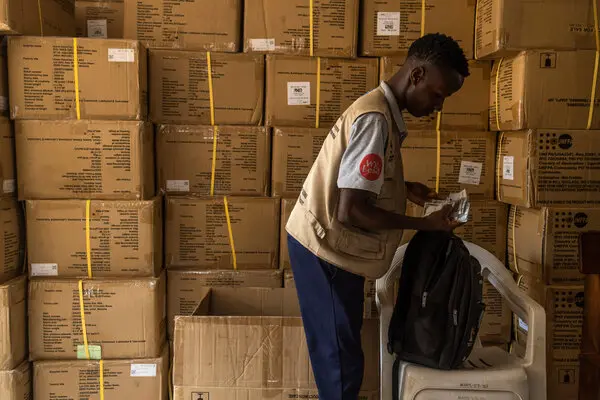A usually low-key race has taken on unusually high stakes as the party prepares to host the first primary of the 2024 campaign and seeks to reverse its recent misfortunes.
-
Send any friend a story
As a subscriber, you have “>10 gift articles to give each month. Anyone can read what you share.
Give this article

Representative James E. Clyburn of South Carolina weighed in on the state Democratic Party’s leadership race, backing Christale Spain, a party veteran who would be the first Black woman to lead the party if she is victorious.
COLUMBIA, S.C. — Representative James E. Clyburn of South Carolina, a longtime kingmaker in Democratic politics who helped resurrect President Biden’s 2020 presidential campaign, exercised his influence on Wednesday over a much smaller race far closer to home: the campaign to determine who will lead his state’s Democratic Party.
Mr. Clyburn endorsed Christale Spain, a former party executive director who once worked in his South Carolina office and would be the first Black woman to lead the party if elected. His involvement underlines the larger-than-usual stakes of the three-candidate race, a contest that has often been a low-key, noncompetitive affair for a behind-the-scenes post.
As Democrats in South Carolina recover from several damaging election cycles and stare down their debut as the party’s first presidential primary state, a once-in-a-generation campaign for state party chair has been brought to life, complete with the kind of glad-handing, fund-raising and mudslinging more often encountered in a congressional primary. At stake is who will prepare the party for the next election while staving off further down-ballot losses.
The three candidates — the most in over 25 years — represent factions of the state’s Democratic base, from its grass-roots activists to high-powered operatives. Ms. Spain is widely viewed as the front-runner. But the same résumé that brought Mr. Clyburn to her camp has been fodder for some of her biggest critics, who say the party needs a major overhaul, not a return to the status quo they believe she would represent.
More than 1,600 county delegates will vote for the chair at the end of the month at the annual state Democratic convention in Columbia. The winner, who will serve a two-year term, will be tasked with rebuilding an understaffed and underfunded state party while re-engaging key Democratic constituencies.
The central question, however, is just what strategy the party will employ as it prepares for prime time.
“We have an opportunity to stop the bleeding,” Ms. Spain said. “We could have this funding stream that comes in because of our new status. But if we muck it up, then what happens? Every cycle is a 2022 cycle? That’s our new normal forever? That’s the worst that can happen.”
For many South Carolina Democrats, the 2022 midterm elections are burned in their memory, as party veterans lost a host of previously safe races from school boards to the State House, where Democrats ceded eight seats to Republicans — five of which had been held by Black women. The G.O.P. secured a supermajority for the first time since the Civil War era.
Image“We have an opportunity to stop the bleeding,” Ms. Spain said.Credit…Sean Rayford for The New York Times
The state party was too short on cash to support most of its candidates and did little to coordinate strategy with its nominee for governor, Joe Cunningham, who lost to the incumbent, Henry McMaster, by nearly 20 points. Paltry engagement with Black voters sank their turnout to the lowest in decades. Democratic officials largely faulted the party’s state leadership for the poor showing.
“It was almost as if we just have lost our way, lost our direction,” said State Senator Vernon Jones, whose district covers five counties. “We don’t have the right message.”
The Democrats’ Primary Calendar
Upending decades of political tradition, members of the Democratic National Committee have voted to approve a sweeping overhaul of the party’s primary process.
- Demoting Iowa: Democrats are moving to reorder the primaries by making South Carolina — instead of Iowa — the first nominating state, followed by Nevada and New Hampshire, Georgia and then Michigan.
- A New Chessboard: President Biden’s push to abandon Iowa for younger, racially diverse states is likely to reward candidates who connect with the party’s most loyal voters.
- Obstacles to the Plan: Reshuffling the early-state order could run into logistical issues, especially in Georgia and New Hampshire.
- An Existential Crisis: The push to dethrone Iowa has inspired a rush of wistful memories and soul-searching among Democrats there.
Against the backdrop of preparations for the 2024 primary, the newly prominent chair race has underscored Democrats’ competing messages for how to improve their standing in the state — via incremental steps to raise money and take back seats or through untested strategies the party has been reluctant to employ.
Ms. Spain’s most formidable competitor is Brandon Upson, the chair of the state Democratic Party’s Black caucus, who is running as part of a four-person slate of candidates for party leadership posts. Catherine Fleming Bruce, an activist who fell short in the 2022 Democratic primary for U.S. Senate, is also running.
The candidates have spent months crisscrossing the state, stumping at county party meetings and recruiting surrogates. Some Democratic groups are exploring the possibility of hosting a debate. Ms. Spain distributes mailers with her campaign message at every stop she makes. Mr. Upson’s slate has established an account on the political donation website ActBlue for its fund-raising. His message to delegates is simple: I’m tired of losing.
“The same people have been running our party and handpicking our party chair for 25 years,” Mr. Upson said. “And if you look at the trend line for this party over the 25 years, we’ve been losing more and more every cycle.”
ImageBrandon Upson, who is challenging Ms. Spain for the Democratic Party leadership role, at a labor protest outside a Ryder trucking warehouse in Columbia, S.C.Credit…Maya King/The New York Times
The state’s more enthusiastic Democrats have been clamoring for a way to win back seats and put South Carolina in play in the same way that Georgia, its neighbor to the west, has been. Ms. Spain has cautioned fellow Democrats against overplaying their hand, even in the face of the money and attention that voting first in 2024 might bring. Those kinds of inroads are made over several cycles, she said, and will require newer, bolder — and realistic — thinking.
“We have to be strategic and responsible about what we’re doing,” Ms. Spain said at a recent meeting of Orangeburg County Democrats. “We have to establish our battlefield.”
That battlefield makes up all 46 of South Carolina’s counties and the voters whom Democrats have failed to mobilize. Her main focus, she said, will be on winning back the State House seats the party lost in previous cycles and protecting the remaining safe seats. Then they can talk about unseating Republicans.
Much of Ms. Spain’s stump speech focuses on her experience. She started at the state party as a volunteer and worked for the last three state chairs. In 2016, she joined Bernie Sanders’s presidential campaign team. After directing Cory Booker’s South Carolina operation in 2020, she coordinated Jaime Harrison’s U.S. Senate campaign with the state party. In 2022, she directed Black engagement for the Democratic Congressional Campaign Committee. The departing state party chair, Trav Robertson, is also supporting her bid.
On the other hand, Mr. Upson is aiming to harness grass-roots groups, young voters and political newcomers — a constituency that has grown in the state in recent years. Under his leadership, the state party’s Black caucus has expanded its membership, putting a healthy number of delegates in his corner.
“That’s where my base of support is,” he said. “You’re not going to see it in James Clyburn’s office.”
On Tuesday morning, Mr. Upson joined more than three dozen labor activists protesting working conditions at a factory outside Columbia. After sweating and chanting in the sun outside a Ryder trucking warehouse, he encouraged the crowd to think of the Democratic Party as a partner in their activism, not a bystander.
“We have to remind ourselves that we are the people — and we have the power in our hands,” he told the group.
Mr. Upson, an Army veteran, has focused much of his organizing work on engaging Black male voters in low-income communities — a part of his biography that he has also promoted in his campaign. In 2020, he was national organizing director for Tom Steyer, whose presidential bid injected millions into South Carolina and frustrated the leaders backing Mr. Biden, who claimed the billionaire was buying Black support. Mr. Upson vehemently denies those claims.
But it was Mr. Upson’s work with a candidate for Charleston County Council that agitated even more Democrats. In 2022, he helped a Republican, Joe Boykin, unseat the county’s Democratic chair, Anna Johnson. Both Mr. Boykin and Mr. Upson maintain that Mr. Upson’s involvement was limited to building Mr. Boykin’s campaign website. Still, his victory handed the balance of power on the council to Republicans and cemented a line of attack for Ms. Spain’s supporters.
ImageCatherine Fleming Bruce, who fell short in the 2022 Democratic primary for U.S. Senate, is running for the leadership post, as well.Credit…Meg Kinnard/Associated Press
In describing the state of the race, Mr. Clyburn paraphrased from the Bible: “They are not known by their words but their deeds.”
“If somebody tells you they are a Democrat, and you look at what they’re doing and it’s all been to help Republicans, what am I supposed to believe about you?” he said.
And for Ms. Spain, the messaging from her opponents echoes a familiar pattern she has observed in politics, of suspicions about qualified Black women in power. Or, worse, being brushed aside for opportunities with little reason.
“Being a Black woman with a strong résumé for the role, people can turn that into a negative,” she said. “I’ve been doing the jobs that have been put in front of me. I’ve built the relationships that I’ve had an opportunity to build, not for any hidden agenda, but because I’m working with them.”
Gilda Cobb-Hunter, an influential state lawmaker, is supporting Mr. Upson. She is encouraging delegates to pledge their allegiance to the candidate who, she said, is “not in the clique.”
“This party has been run for too many years by cliques,” she said. “I want somebody who is interested in expanding the circle.”
Ms. Cobb-Hunter, who is Black, recognized the historic implications of having a party led by a Black woman for the first time. However, she said, the determining factor in her decision came down to who she most believed could help Democrats in the state win elections again.
“Politics, to me, is a business. It’s not personal. It’s about getting the job done,” she said. She later added, “Simply basing something on gender in and of itself is shortsighted, in my view.”
Mr. Stephens, the state senator, announced at the Orangeburg County party meeting that after weeks of deliberation and conversations with all three candidates, he would support Ms. Spain. Fresh off a visit with Black Democrats in rural South Carolina, he said the next chair should be mindful of a shift he has observed in the electorate.
“The citizens are taking things in their own hands,” he said. “They’re going to vet candidates. They’re no longer going to be told that ‘this is the individual you should be voting for.’ They are going to vote their conviction. South Carolina is changing.”
Source: nytimes.com



